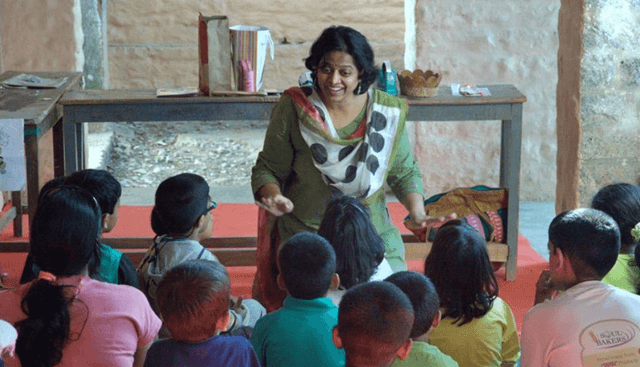


By Arthi Anand Navaneeth
“If you talk to a man in a language he understands, that goes to his head. If you talk to him in his language, that goes to his heart,” said Nelson Mandela. But is the mother tongue losing relevance as the prime language in one’s life? Don’t most urban Indian children express & understand better in English?
India is a country with multiple languages and countless dialects. Today, a child of upwardly mobile parents ends up ‘learning’ three to four languages. He learns English for academic & social interaction , Hindi for ( debatable) pan-national communication, local language to fit in and mother tongue to know his parents’ heritage and literature. Add one more language if his parents come from different language backgrounds, another growing trend.
Multi lingual publishers are doing their bit to make local languages fun but our school system places excessive emphasis on literature/ grammar rather than communication while teaching language. The question to be asked: Is the child then intimidated by language learning? Waiting to move on to some better scoring foreign language?
Children certainly have the capacity to learn two or more languages at the same time. If parents know the language themselves, then with their encouragement and use, the mother tongue can be easily taught at home.
Few immigrants are fully literate in their own mother tongue, while many still manage to understand and converse. If communication is the need, then the dominant local language is what needs to be learnt. After all when in Rome, do as the Romans. Is one’s mother tongue necessary to feel affinity for one’s culture?
Without doubt, the appreciation of literary works would be impacted. And of pop culture- movies, music and TV shows. Every language has a personality. The lilt and accent used can offer room for discussion. As parents, we can share those observations to enable our children appreciate it better.
But we live in a multicultural society and it would be wise to be welcoming of all languages. Language is an enabler. While it is fun and enriching to know more than one, there need not be a premium placed on one’s mother tongue.
For the larger rural population, who are adept at their mother tongue, we need to ensure reading material and teaching medium is in the vernacular! This will ensure that regional languages thrive. But we must also encourage English learning among them to provide equal opportunity.
Finally language has to be one that goes to the heart, whether it is one’s mother tongue or some one else’s.
I am a Tamilian, born in Tamil heartland – Dindigul. Raised for a few years in Tamil Nadu, I was clearly bilingual- using Tamil and English with equal ease. And then we moved to Andhra and Telugu took over. We moved to Mumbai and I began to enjoy Marathi . My Tamil improved only in my teens, once AR Rahman and Mani Ratnam entered my life. And post marriage, when I shifted to Chennai, I knew my zzhhh and truly learnt Tamizh.